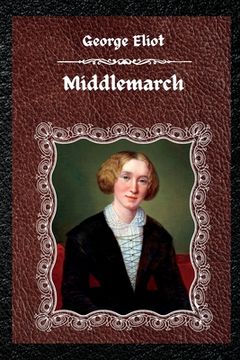Reseña del libro "Middlemarch (en Inglés)"
Middlemarch, A Study of Provincial Life is a novel by the English author Mary Anne Evans, who wrote as George Eliot. It first appeared in eight installments (volumes) in 1871 and 1872. Set in Middlemarch, a fictional English Midland town, in 1829 to 1832, it follows distinct, intersecting stories with many characters. Issues include the status of women, the nature of marriage, idealism, self-interest, religion, hypocrisy, political reform, and education. Despite comic elements, Middlemarch uses realism to encompass historical events: the 1832 Reform Act, early railways, and the accession of King William IV. It looks at medicine of the time and reactionary views in a settled community facing unwelcome change. Eliot began writing the two pieces that formed the novel in 1869-1870 and completed it in 1871. Initial reviews were mixed, but it is now seen widely as her best work and one of the great English novels.George Eliot's Victorian masterpiece: a magnificent portrait of a provincial town and its inhabitants.George Eliot's novel, Middlemarch: A Study of Provincial Life, explores a fictional nineteenth-century Midlands town in the midst of modern changes. The proposed Reform Bill promises political change; the building of railroads alters both the physical and cultural landscape; new scientific approaches to medicine incite public division; and scandal lurks behind respectability. The quiet drama of ordinary lives and flawed choices are played out in the complexly portrayed central characters of the novel-the idealistic Dorothea Brooke; the ambitious Dr. Lydgate; the spendthrift Fred Vincy; and the steadfast Mary Garth. The appearance of two outsiders further disrupts the town's equilibrium-Will Ladislaw, the spirited nephew of Dorothea's husband, the Rev. Edward Casaubon, and the sinister John Raffles, who threatens to expose the hidden past of one of the town's elite. Middlemarch displays George Eliot's clear-eyed yet humane understanding of characters caught up in the mysterious unfolding of self-knowledge.The action of Middlemarch takes place "between September 1829 and May 1832", or 40 years before its publication in 1871-1872, a gap not so pronounced for it to be regularly labelled as a historical novel. By comparison, Walter Scott's Waverley (1814) - often seen as the first major historical novel - takes place some 60 years before it appears. Eliot had previously written a more obviously historical novel, Romola (1862-1863), set in 15th-century Florence. The critics Kathleen Blake and Michael York Mason argue that there has been insufficient attention given to Middlemarch "as a historical novel that evokes the past in relation to the present".The critic Rosemary Ashton notes that the lack of attention to this side of the novel may indicate its merits: "Middlemarch is that very rare thing, a successful historical novel. In fact, it is so successful that we scarcely think of it in terms of that subgenre of fiction." For its contemporary readers, the present "was the passage of the Second Reform Act in 1867"; the agitation for the Reform Act of 1832 and its turbulent passage through the two Houses of Parliament, which provide the structure of the novel, would have been seen as the past.Though rarely categorized as a historical novel, Middlemarch's attention to historical detail has been noticed; in an 1873 review, Henry James recognised that Eliot's "purpose was to be a generous rural historian". Elsewhere, Eliot has been seen to adopt "the role of imaginative historian, even scientific investigator in Middlemarch and her narrator as conscious "of the historiographical questions involved in writing a social and political history of provincial life". This critic compares the novel to "a work of the ancient Greek historian Herodotus", who is often described as "The Father of History".

